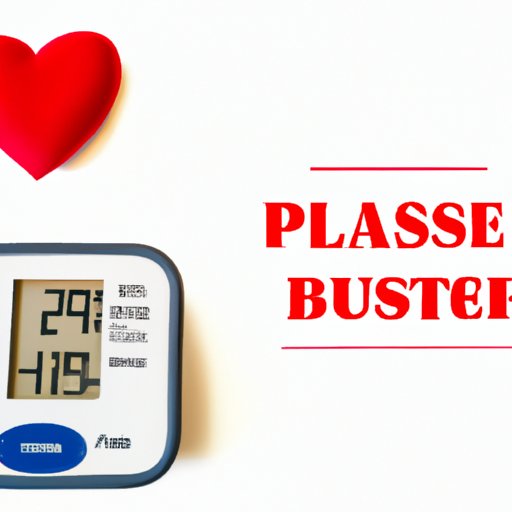Introduction
High blood pressure, also known as hypertension, can increase the risk of heart disease, stroke, and other health issues. Blood pressure is measured as the force of blood against the walls of arteries and is a reflection of how hard the heart is working. Maintaining healthy blood pressure levels is essential for overall health and wellness. This article will provide practical tips on how to lower blood pressure through diet, exercise, stress management, reducing alcohol intake, quitting smoking, getting enough sleep, and regularly monitoring blood pressure.
Diet Changes
The food we eat has a significant impact on our blood pressure. Consuming foods high in sodium can lead to increased blood pressure levels. Foods high in sodium include processed meats, canned goods, and packaged snacks. Reducing sodium intake and incorporating healthier food options can help lower blood pressure. Some examples of low-sodium foods include fresh fruits and vegetables, whole-grain foods, lean protein, and unsalted nuts. Making gradual changes and incorporating healthy foods into your diet is an excellent way to lower blood pressure. Consult with a doctor or a registered nutritionist to learn more about incorporating a heart-healthy diet into your lifestyle.
Exercise
Regular physical activity can help keep blood pressure levels healthy. Physical activities such as moderate aerobics, brisk walking, cycling, or swimming for 30-60 minutes daily can help reduce high blood pressure. Exercise helps the heart pump blood more efficiently, resulting in reduced blood pressure over time. One can also incorporate daily exercise by taking the stairs instead of the elevator, walking to nearby destinations instead of driving, or simply taking a 10-15 minute walk during work breaks. Consult with a doctor before beginning any exercise regimen.
Stress Management
Stress can cause temporary spikes in blood pressure, which can lead to long-term issues. Activities such as meditation, deep breathing exercises, and yoga can help reduce stress levels. Taking a break or an afternoon nap, listening to soothing music, or enjoying hobbies can also help reduce anxiety and stress levels. Some people find that spending time with pets, talking with friends or taking a relaxing bath can reduce stress levels. Creating a stress-free environment by taking walks or engaging in physical activities can also reduce stress and fatigue over time.
Reducing Alcohol Intake
Excessive alcohol can cause high blood pressure and other health problems such as liver disease and obesity. Reducing alcohol intake or seeking professional help to quit altogether can help reduce health problems associated with alcohol consumption. One can drink alcohol in moderation (up to one drink per day for women and up to two drinks per day for men), or simply avoid it altogether. Find alternative ways to have fun, such as joining a social club or taking part in physical activities.
Quit Smoking
Morbidly, smoking tobacco can lead to a host of health problems, such as lung cancer, heart disease, and high blood pressure. Smoking increases heart rate, narrows blood vessels, and lowers oxygen levels, leading to an increase in blood pressure levels. Quitting smoking can reduce the risk of developing high blood pressure and other health issues. Those who struggle with quitting smoking can use nicotine patches, chewy gums, or talk to their healthcare provider for additional support.
Get Enough Sleep
Adequate sleep is crucial in regulating blood pressure levels. Getting enough sleep can help the body relax and reduce stress levels, leading to lower blood pressure levels. Experts recommend getting 7-9 hours of sleep per night to help manage high blood pressure. One can establish a sleep schedule, avoid electronic devices before bedtime, or relax before bedtime to improve sleep quality. Finding the right sleep environment, such as keeping the room temperature comfortable, can also promote better sleep hygiene.
Monitor Your Blood Pressure
Checking blood pressure regularly is essential in maintaining healthy blood pressure levels. One can purchase a blood pressure monitor for home use or measure blood pressure at a local pharmacy or doctor’s office. Experts recommend measuring blood pressure regularly or as recommended by a healthcare provider. Blood pressure should be checked in the morning or before bedtime and fairly consistently every day. Tracking blood pressure levels can help patients and their healthcare providers develop treatment plans and adjust their lifestyles accordingly.
Conclusion
In conclusion, lifestyle changes can help lower blood pressure levels and maintain healthy blood pressure. The tips discussed in this article, including diet changes, exercise, stress management, reducing alcohol intake, quitting smoking, getting enough sleep, and regularly monitoring blood pressure, can make a significant impact on overall health and wellness. Incorporating these changes into your daily routine can take time; one can take small steps towards each change to achieve the goal. Remember to consult with a healthcare provider before making any significant changes in lifestyle to ensure safety and effectiveness.
